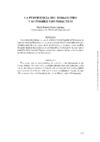Identificador persistente para citar o vincular este elemento:
https://accedacris.ulpgc.es/jspui/handle/10553/5014
| Campo DC | Valor | idioma |
|---|---|---|
| dc.contributor.author | Cáceres Lorenzo, María Teresa | en_US |
| dc.date.accessioned | 2011-03-29T02:31:00Z | - |
| dc.date.accessioned | 2018-03-07T09:34:10Z | - |
| dc.date.available | 2011-03-29T09:41:55Z | - |
| dc.date.available | 2018-03-07T09:34:10Z | - |
| dc.date.issued | 1991 | en_US |
| dc.identifier.issn | 0213-0610 | en_US |
| dc.identifier.other | Dialnet | - |
| dc.identifier.uri | https://accedacris.ulpgc.es/handle/10553/5014 | - |
| dc.description.abstract | Con el presente trabajo se trata de entender la complejidad del fenómeno de la pervivencia del Romancero en las Islas Canarias. En él se presentan múltiples ejemplos tanto de esta conservación de elementos y romances, como también una gran cantidad de pruebas de la aclimatación y la adaptación de este tipo de tradición oral a Canarias. También proponemos algunas ventajas e inconvenientes del uso didáctico de este Romancero. | en_US |
| dc.description.abstract | This paper aims at understanding the survival of the Romancero in the Canary lslands. This survival is a complex phenomenon, and it presents a rich variety regarding the presence of features and romances in the Canaries, and the great diversity of archaisms and new Canarian contributions. Finally we also offer some practica1 and theoretical ideas for a didactic study of Romancero. | en_US |
| dc.format | application/pdf | - |
| dc.language | spa | en_US |
| dc.relation.ispartof | El Guiniguada | en_US |
| dc.source | El Guiniguada [ISSN 0213-0610], n. 2, p. 273-278 | en_US |
| dc.subject | 5801 Teoría y métodos educativos | en_US |
| dc.subject | 570107 Lengua y literatura | en_US |
| dc.subject.other | Romancero | en_US |
| dc.subject.other | Islas Canarias | en_US |
| dc.subject.other | Tradición oral | en_US |
| dc.title | La pervivencia del Romancero y su posible uso didáctico | en_US |
| dc.type | info:eu-repo/semantics/article | en_US |
| dc.type | Article | en_US |
| dc.identifier.url | http://dialnet.unirioja.es/servlet/articulo?codigo=321587 | - |
| dc.compliance.driver | 1 | - |
| dc.identifier.absysnet | 235347 | - |
| dc.identifier.crisid | 1412 | - |
| dc.description.lastpage | 278 | - |
| dc.identifier.issue | 2 | - |
| dc.description.firstpage | 273 | - |
| dc.investigacion | Artes y Humanidades | en_US |
| dc.rights.accessrights | info:eu-repo/semantics/openAccess | - |
| dc.type2 | Artículo | en_US |
| dc.identifier.external | 1412 | - |
| dc.identifier.external | 1412 | - |
| dc.contributor.authordialnetid | 561368 | - |
| dc.identifier.dialnet | 321587ARTREV | - |
| dc.utils.revision | Sí | en_US |
| dc.identifier.ulpgc | Sí | es |
| dc.description.sellofecyt | Sello FECYT | |
| dc.description.esci | ESCI | |
| dc.description.erihplus | ERIH PLUS | |
| item.fulltext | Con texto completo | - |
| item.grantfulltext | open | - |
| crisitem.author.dept | GIR IATEXT: División de Estudios de Corpus y Lingüística Aplicada | - |
| crisitem.author.dept | IU de Análisis y Aplicaciones Textuales | - |
| crisitem.author.dept | Departamento de Filología Hispánica, Clásica y de Estudios Árabes y Orientales | - |
| crisitem.author.orcid | 0000-0002-1683-9025 | - |
| crisitem.author.parentorg | IU de Análisis y Aplicaciones Textuales | - |
| crisitem.author.fullName | Cáceres Lorenzo, M. Teresa | - |
| Colección: | Guiniguada. 2ª Etapa. n.02, 1991 Artículos | |
Visitas
63
actualizado el 10-ene-2026
Descargas
240
actualizado el 10-ene-2026
Google ScholarTM
Verifica
Comparte
Exporta metadatos
Los elementos en ULPGC accedaCRIS están protegidos por derechos de autor con todos los derechos reservados, a menos que se indique lo contrario.
